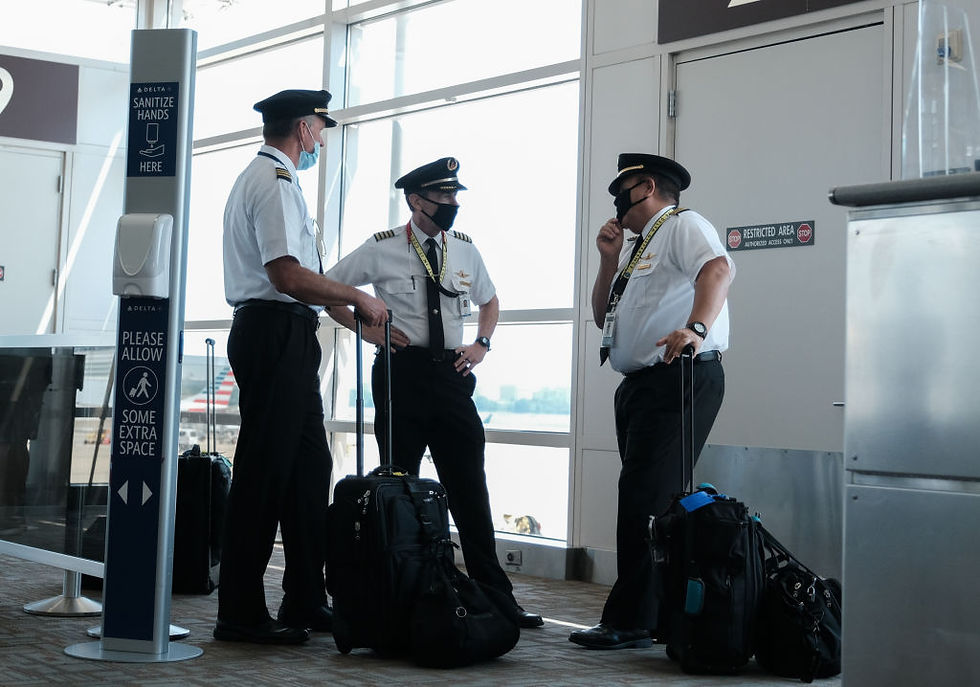How Pilot Unions Capitalised on Tragedy to Manufacture a Pilot Shortage
- Jan 10, 2024
- 4 min read
U.S. Pilot wages have sky-rocketed in recent years. In 2023, pilots ranked among the top ten paying jobs, according to U.S. News – the rest all being medical professions. ATP Flight School currently attracts prospective pilots through advertising the potential for a “A Ten Million Dollar Career”.
Unions, such as the Air Line Pilots Association (ALPA), which represents over 77,000 pilots at 43 different U.S. and Canadian airlines, have played a large role in securing these salaries. Only last December Southwest pilots received a hefty pay rise, whilst United Airlines approved a new contract valued at $10.2 billion over four years in September. This included cumulative rises in total compensation as high as 40.2%.
Despite all this, there still remains a pilot shortage. The total number of active commercial and transport pilots holding certificates in the U.S., according to FAA data, was lower in 2022 (271,236) than in 2008 (271,584). Meanwhile, consumer demand for commercial flights in the U.S. has only increased, despite the COVID-19 induced dip of 2020-2021.
2023 witnessed the U.S.’ busiest year for air travel in over a decade, with Thanksgiving Sunday delivering the busiest day for airline travel in U.S. history. AAA spokesperson, Aixa Diaz, commented in an interview with Fortune that “desire to get away is stronger than we have seen in a very long time”. This shortage in critical staff has contributed to some of the aviation industry’s post-Covid troubles, including Southwest Airlines’ infamous travel meltdown of Christmas 2022

So how has this shortage come about?
Much of the current shortage can be attributed to a targeted lobbying campaign orchestrated by ALPA in the aftermath of a national tragedy.
On February 12 2009, Colgan Air Flight 3407 – a Bombardier Q400 – fell into an aerodynamic stall. After failing to recover, the plane crashed into a house, killing all 49 souls on-board, including crew, and one resident in the house.
An accident investigation report conducted by the National Transport Safety Board concluded that the pilots’ inappropriate response to stall warnings was “the probable cause” of the crash.
Soon after, heartbroken families affected by the incident lobbied Congress to enact more stringent regulations for regional carriers and improve the scrutiny of safe operating procedures. With the help of unions, including ALPA, monumental changes were made to airline safety.
As a result, numerous reforms were approved by the FAA to increase air travel safety through regulation – one of these being a rule change dictating that all airline pilots (captain and first officer) could only hold Airline Transport Pilot (ATP) certificates with a minimum flight-experience of 1,500 hours rather than the previous 250 hours.
The FAA allows no exceptions to the 1,500 hour rule for any pilot wishing to fly for either a regional or international U.S. airline. This is in stark contrast to their counterparts in the UK and European Union, who only need 250 hours to qualify. Unsurprisingly, these nations are less impacted by recent pilot shortages, whilst the U.S. has failed to keep up with demand.
Many understand the 1,500 hour rule to be primarily responsible for the pilot shortage that is crippling aviation travel in the U.S.
It is, however, less common knowledge that this drastic jump to the 1,500 hour requirement, approved by the FAA, would not actually have affected the infamous Colgan accident, since both pilots held ATP certificates and had more than 1,500 hours of experience.
With this regulation in place since 2010, pilot numbers simply have not risen to cope with increasing travel demand. Meanwhile, ALPA continues to capitalise this tragedy, keeping pilot numbers low to increase the power of its union, at the expense of U.S. passengers.

In the latter half of 2023, Congress attempted to pass an aviation bill that would see the retirement age of pilots rise from 65 to 67. The move is clearly reflective of the current strain aviation travel is facing due to a shortage of pilots. however, ALPA continues to deny that there is a pilot shortage and stopped at nothing to try and block the bill.
These efforts are anathema to the wishes of many ALPA members, causing internal strife. Bo Ellis, a 64-year-old pilot represented by ALPA over the last four decades, is waging a campaign against his own union to extend his flying career.
The bill, according to the Regional Airline Association (RAA), is estimated to provide at least 5,000 pilots with two additional years of work. This would simultaneously alleviate the growing strain of the pilot shortage in both the short and long-term.
In August last year, Ellis, a head pilot at a major carrier, said that senior pilots are "by far much safer" due to experience and accused ALPA of "politicizing" safety.
"My own union is being discriminatory against me," he further commented.
Ellis speaks for many experienced U.S. pilots, who all only see the benefit of the bill. Pilot unions are damaging the interests of their members, as well as potentially jeopardising the safety of passengers and contributing to delays and cost increases.
Airlines have also worked proactively to combat the stifling efforts of ALPA. Delta Air Lines, back in March 2023, announced the launch of their new flight academy to train pilots.

The Delta Propel Pilot Academy, based in a 12,000-square-foot facility Skyborne's Florida campus, has already had a positive effect on the pilot shortage, despite union efforts. Other carriers have followed suit.
“This is our largest-ever Propel Company Path class, and this industry-leading program will give these employees a structured pathway to a Delta flight deck,” said Eric Hendrick, Director of Pilot Outreach at Delta, in an interview in November 2023.
It is now time that ALPA pulled together with airlines to address the pilot shortage and alleviate the increasing strain on the aviation industry.




Comments